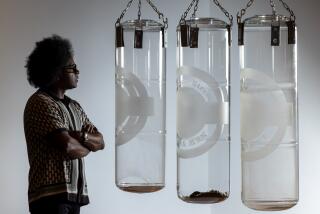DANCE REVIEW : Family Lives in ‘Urban Scenes’ : David Rousseve’s continuing story links his times with his grandparents’ in a memorable outing at Wadsworth.
- Share via
Not every manchild grows up to become his own grandmother--but David Rousseve is blessed in many, many ways. Since 1987, this disarming young actor, dancer, choreographer, director and storyteller has turned his family history into memorable performance events, each time linking his life and times with those of his grandmother, the late Thelma Arceneaux.
Announced as the final segment in the series, “Urban Scenes/Creole Dreams” arrived at the Wadsworth Theater on Friday with a number of familiar components. Once more, local audiences heard endearing tales of Rousseve’s first day in a newly integrated Houston school and his love for his “ ‘flicted” pet rat. Once more, Rousseve and his REALITY company (augmented by local dancers) depicted horrific instances of rape and revenge--as well as noble acts of love and solidarity--among desperately poor sharecroppers.
Local gospel diva B. J. Crosby again delivered a roof-rattling rendition of “Amazing Grace,” and Rousseve again achieved a remarkable fusion of voice and sensibility with his dead grandmother.
This time around, an accomplished choir led by Ron Hasley served as a collective social conscience, whether powerfully announcing a call-to-battle “against misogyny, race-hatred and AIDS” (singing music composed by Ysaye M. Barnwell) or detailing through chant the layering of oppression and corrosive rage that eventually destroyed Rousseve’s grandfather.
This latter sequence found the choir members deployed at the back and sides of the stage, accompanying themselves with hand claps and a pole struck against the floor. In the center, Rousseve joined his six company dancers and five guests in propulsive choreography emphasizing shared weight, pieta poses and outbursts of furious trembling. At the end, the naked body of Van Vereen hanged from a noose overhead: a classic image of American brutality presented as a Rousseve family heirloom.
More nudity occurred in an initially enigmatic bathtub sequence serving as a premonition to the rape of Thelma’s beloved cousin Bobbie. More nooses appeared during a spectacular fantasy-in-the-clouds dramatizing nothing less than the conquest of death through love and memory. For all his stand-up-style looseness, Rousseve structured his work carefully, tying sequences together to draw parallels between the precarious existence of his grandparents and the perils of the ongoing AIDS crisis.
The experience of frequent, unbearable loss links these generations, but in his family’s continuity-against-the-odds, Rousseve discovered something like salvation: “Turn to your ancestors to find hope.”
You could argue that “Urban Scenes/Creole Dreams” tells deeper truths about his grandmother than about himself, but he also makes it easy to believe that she’s become the best part of him--allowing him to speak with personal authority about the love and pain of a lost world. In the process, a family legacy becomes a national cultural monument.
More to Read
The biggest entertainment stories
Get our big stories about Hollywood, film, television, music, arts, culture and more right in your inbox as soon as they publish.
You may occasionally receive promotional content from the Los Angeles Times.










